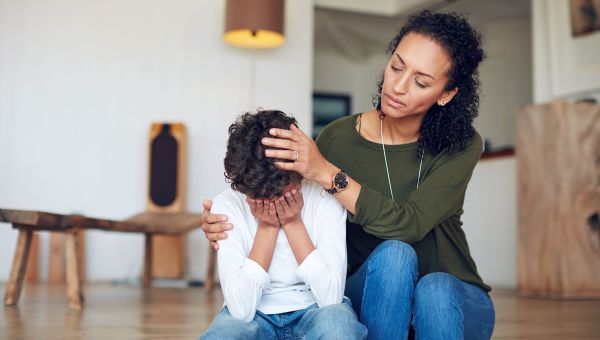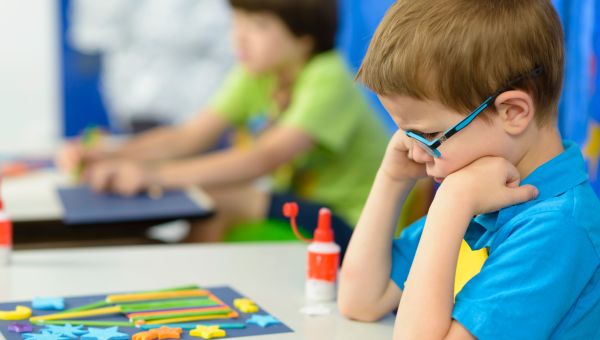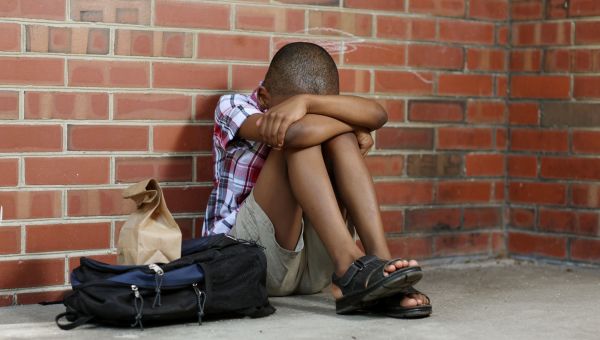Does Your Child Need Mental Health Help? 7 Signs You Shouldn't Ignore
One in every five US children between the ages of 13 and 18 have a mental illness.

The journey through childhood and adolescence can be a difficult one, paved with physical and emotional twists and turns. Oftentimes, it's normal for young people to experience shifts in their physical and emotional behavior, but sometimes, these changes can signal a mental health problem.
Teens and kids experience the same mental health issues adults do, including anxiety, eating disorders, posttraumatic stress disorder (PTSD) and bipolar disorder. However, they may not experience the same signs as adults, and sometimes the symptoms aren’t as obvious, either.
Teens and children often struggle to rationalize and vocalize their feelings, so parents should watch out for even subtle changes. A physician’s evaluation may also be extremely important, since some mental illness are more severe than others. Acute mental illness, like schizophrenia, characterized by psychotic episodes, and some forms of depression can be debilitating and need immediate medical attention. It can be tough for a parent to determine the severity of a condition. Spotting the signs of any disorder and making an appointment quickly can be important, since swift treatment is typically more effective.
These seven indicators can point to a number of different conditions, and should not be ignored. A doctor or other mental health professional can best identify the problem and get your child the help he or she needs.

Frequent and intense mood swings
When you hear the term "mood swing" your mind might rush to an image of a temperamental teen or adolescent. The truth is most people—adults included—experience mood swings, a rapid change in feelings, from time to time, but the reason for these shifts can vary.
Changing and fluctuating hormones can cause mild moodiness, but swings that are intense or happen frequently may not be a product of normal adolescent angst. Extreme changes in a child's mood can signal bipolar disorder or depression.
Although we know bipolar disorder is a brain illness, the underlying cause is not well known, and experts believe it may be the result of a chemical imbalance in the brain, environmental factors like trauma, or both. Swings vary between children, but may include periods of high energy, irritability, unusual happiness, extreme sadness or lack of energy.
Mood disorders can be treated with medications and therapies, but not without proper diagnosis. If your child experiences unusually frequent or severe changes in mood, speak with a healthcare provider about evaluation for a mental illness.

Difficulty executing daily tasks
Mental illness can make performing daily tasks, like attending school, getting up for work, cooking and cleaning tough for children and adults. Anxiety-related conditions, like generalized anxiety disorder, social anxiety, panic attacks and phobias and their related symptoms, can interfere with a person’s ability to function on a day-to-day basis.
A child with an anxiety disorder may:
- Find it difficult to concentrate
- Become irritable
- Perform poorly in school
- Be restless or fatigued during the day
- Experience headaches or stomachaches
Children with anxiety often avoid talking about their feelings because they fear others—especially their parents—will worry. Parents who spot signs of anxiety in their children should talk to them in a supportive and nonjudgmental way.
Difficulty concentrating and staying on task also be signs of depression or attention deficit hyperactivity disorder (ADHD). Any child who struggles to complete daily tasks should be evaluated by a professional.

A change in eating habits
It's common to compare yourself to others, but when your child is going to extreme measures to obtain the "picture-perfect" appearance, it may be time for a parent to step in.
Eating disorders, like anorexia nervosa, bulimia nervosa and binge-eating disorder, are serious conditions characterized by unhealthy eating behaviors, like restricting calories, binging and purging or regularly eating large qualities of food.
Signs of these mental illnesses can vary, but often include:
- Skipping meals
- A drastic increase in exercise
- Routinely making a trip to the bathroom during meals
- Eating quickly and consuming more food than normal
- Frequently complaining about his/her body
- Weight loss or lack of expected weight gain
Eating disorders like anorexia and bulimia can cause some serious damage, affecting your heart, digestion, bones, menstrual cycle and kidneys. Binge eating doesn't always lead to weight gain, but it can, which would likely increase your risk for diabetes, hypertension and heart disease.
Sometimes, changes in eating habits can signal a disorder like anxiety or depression, too. Don’t let changes in your child's eating habits go unnoticed; make an appointment with a physician.

Signs of self-harm
Self-harm refers to the act of intentionally inflicting nonfatal pain on yourself, and one in every 100 people in the US do it. This behavior typically begins in teens or young adults, and can include cutting, punching or burning yourself, or pulling out your hair.
Self-harm is not a mental illness, but it may be a signal of an underlying concern, like depression, anxiety or PTSD. Many do it to find some relief from pain, anger or trauma.
Self-harm scars aren't always visible either, so it's important to recognize other signs like:
- Wearing long sleeves or pants in hot weather
- Impulsiveness or unpredictability
- Rubbing an area of skin to create a burn
- Keeping sharp objects on hand
- Fresh cuts or bruises
If you notice these signs, sit down with your child and find out what's been going on. Don’t wait to get your son or daughter treatment for the underlying condition; make an appointment with a healthcare professional right away.

Your child is sad, withdrawn or depressed
We all have our bad days, but when thoughts of sadness linger or performing daily tasks become daunting, it could be a sign your child has depression. This mood disorder is characterized by sadness, irritability and withdrawal that lasts for weeks or months at a time.
Depression can affect a child's energy, sleep and appetite, and makes schoolwork and even keeping up with friends a challenge. There are some other signs your child is experiencing depression and may need help from a professional, like:
- Frequent sadness or crying
- Moodiness
- Irritability
- Withdrawal from family and friends
Depressive symptoms that last for two weeks or interfere with a child's ability to go to school and socialize with other kids, should be brought to a doctor's attention.

Changes in sleeping habits
If you’ve noticed changes in your child’s sleep patterns, it might signal depression, PTSD or other anxiety disorders.
Some concerning signs include:
- Sleeping more or less than usual
- Trouble sleeping
- Nightmares
- Fear before going to bed
Make an appointment with your healthcare provider if you notice these changes. Your doctor can help determine whether the sleep changes are caused by a mental health condition, or a sleep disorder like insomnia, restless legs syndrome and sleep apnea.

Your teen is abusing drugs and alcohol
Many children and teens struggle silently with mental health issues, and may resort to extreme measures to cope with their feelings. Depression, among other mental illnesses, is often coupled with alcohol and prescription drug abuse.
These substances can be addictive and lead to serious health problems. They also impair judgement and increase the likelihood of teens to engage in risky behaviors, like impaired driving and sexual activity.
Some signs of substance abuse among teens include:
- Withdrawing from family
- Disregarding rules
- Exhibiting poor judgement and lack of interest
- A change in friends, eating and sleeping habits and performance in school
Speaking with your teen about drugs and alcohol is a good first step, but if you think the cause of the abuse is a mental health issue or if your child has developed a dependency on these substances, you should contact a healthcare provider.

Getting your child help
It can be tough to watch a child struggle with his or her mental health, but there are treatments available, like therapy to medication. Following diagnosis, your doctor will recommend the best course of treatment for your child, which may include a combination of interventions.
There are a variety of medications that can be prescribed following diagnosis, including stimulant drugs for ADHD, serotonergic medicines for kids with anxiety or depression or neuroleptic medications that help regulate mood swings and manage symptoms of schizophrenia.
Therapies vary as well, and are designed to help teach children—and adults—new behaviors and techniques for coping with symptoms of mental illness. Cognitive behavioral therapy is a common therapy used to help change a child's unhealthy thinking and behavior. Cognitive behavioral therapy can be effective treatment for generalized anxiety disorder, panic attacks and social anxiety. Specific treatment for ADHD is also available, and includes special training for parents and teachers to help children with the condition thrive at home and in the classroom.
Treatment is available, so don't hesitate to call a physician and get your kid the help he or she needs.
More On


video

article

slideshow


video


video
